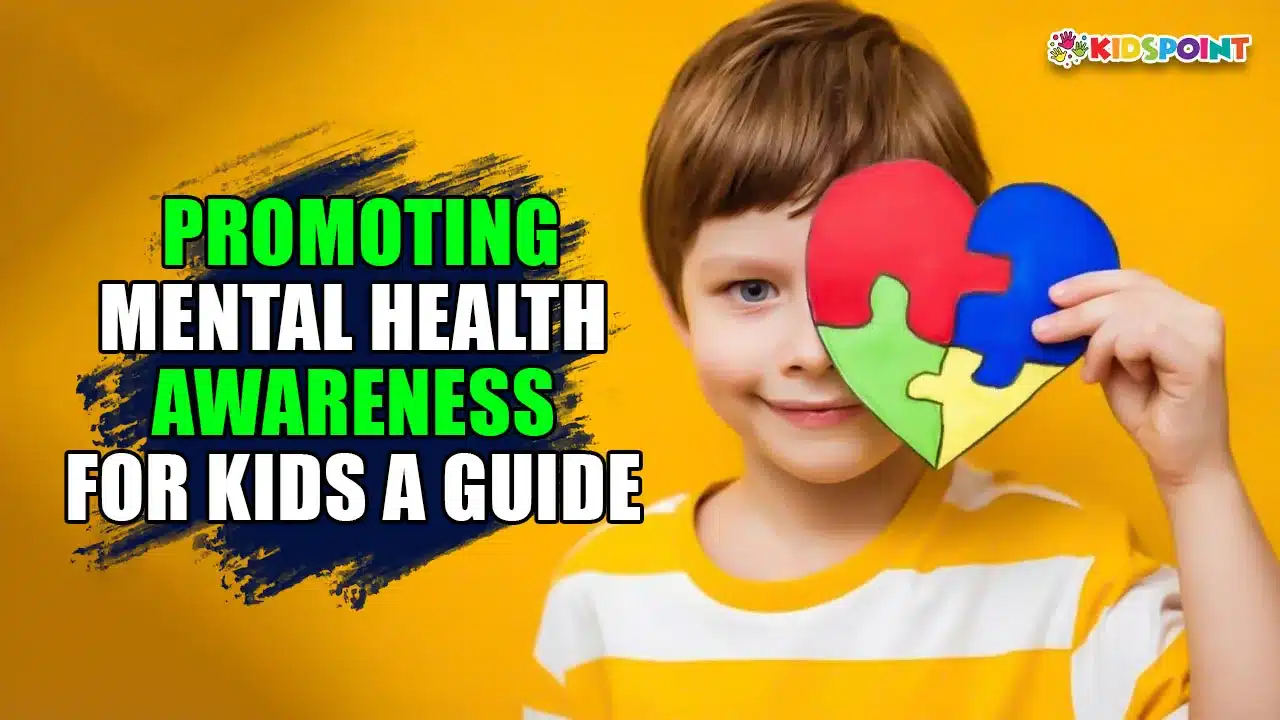Mental health is just as important as physical health, especially for children. With growing societal pressures, academic stress, and emotional challenges, it is essential to promote mental health awareness from an early age. Children need to understand their emotions, learn coping mechanisms, and feel comfortable seeking help when needed. At The Kids Point, we believe that fostering a positive mental health environment can set the foundation for lifelong well-being. This guide provides practical strategies, resources, and insights to support children’s mental health.
Understanding Mental Health in Children
Mental health in children refers to their emotional, psychological, and social well-being. It affects how they think, feel, and behave. Common mental health concerns among children include anxiety, depression, attention-deficit/hyperactivity disorder (ADHD), and behavioral disorders. Recognizing the signs of mental health struggles early on can help in providing timely support and intervention.
Signs of Mental Health Struggles in Kids
- Frequent mood swings: Unexplained sadness, irritability, or withdrawal.
- Changes in behavior: Sudden aggression, defiance, or loss of interest in favorite activities.
- Sleep disturbances: Difficulty sleeping, frequent nightmares, or excessive sleepiness.
- Decline in academic performance: Difficulty concentrating or loss of motivation.
- Physical symptoms: Headaches, stomachaches, or fatigue without medical causes.
- Social withdrawal: Avoiding friends, family, or group activities.
- Increased anxiety: Persistent worries, fears, or panic attacks.
Recognizing these signs is the first step in addressing mental health concerns.
Strategies to Promote Mental Health Awareness in Kids
Open Conversations About Emotions
Encouraging children to talk about their feelings helps normalize discussions about mental health. Parents, teachers, and caregivers should create a safe space for kids to express their emotions without judgment.
- Use age-appropriate language to discuss emotions.
- Encourage children to identify and name their feelings.
- Model healthy emotional expression by sharing your own feelings.
Encourage Healthy Coping Mechanisms
Teaching children how to cope with stress, anxiety, and sadness equips them with lifelong tools for emotional regulation.
- Deep Breathing Exercises: Help kids practice slow, deep breaths to calm their minds.
- Mindfulness and Meditation: Simple mindfulness activities can improve focus and reduce stress.
- Creative Outlets: Encourage drawing, music, or writing as a form of emotional expression.
- Physical Activity: Exercise releases endorphins, which improve mood and reduce anxiety.
Foster Positive Relationships
Strong relationships with family, friends, and teachers provide children with emotional support and a sense of belonging.
- Spend quality time together as a family.
- Encourage social interactions and playtime with peers.
- Teach empathy and kindness to build strong interpersonal skills.
Limit Screen Time and Social Media Exposure
Excessive screen time, particularly on social media, can negatively impact a child’s mental health by increasing anxiety and low self-esteem.
- Set screen time limits and encourage offline activities.
- Monitor social media use and discuss online safety.
- Promote educational and interactive content over passive consumption.
Create a Safe and Supportive Environment
A stress-free and positive home and school environment can significantly impact a child’s mental well-being.
- Maintain a consistent routine to provide stability.
- Offer reassurance and support during stressful situations.
- Encourage open discussions without fear of criticism.
Teach Resilience and Problem-Solving Skills
Building resilience helps children cope with setbacks and develop a positive outlook on life.
- Encourage a growth mindset by praising effort over outcomes.
- Help kids break down challenges into manageable steps.
- Teach conflict resolution and decision-making skills.
Seek Professional Support When Needed
Sometimes, professional intervention is necessary to support a child’s mental health.
- Consult a pediatrician, counselor, or child psychologist for guidance.
- Look for local or school-based mental health programs.
- Normalize therapy as a tool for self-improvement rather than a sign of weakness.
The Role of Schools and Communities
Schools and communities play a crucial role in promoting children’s mental health awareness. They provide structured support systems that help children thrive emotionally and academically.
School-Based Mental Health Programs
- Implement mental health education in school curriculums.
- Train teachers to recognize and respond to mental health concerns.
- Provide school counselors and support groups for students.
Community Support and Awareness Campaigns
- Organize mental health awareness events.
- Encourage parent and caregiver workshops on mental well-being.
- Promote access to local mental health resources and helplines.
Encouraging Self-Care for Kids
Teaching children to take care of their mental health through self-care practices ensures long-term well-being.
Simple Self-Care Activities for Kids
- Journaling: Writing about their day can help process emotions.
- Outdoor Play: Nature and fresh air can boost mood and energy levels.
- Gratitude Practice: Encouraging children to list things they’re thankful for can foster positivity.
- Relaxation Techniques: Listening to music, reading, or taking warm baths can reduce stress.
Breaking the Stigma Around Mental Health
Despite progress in mental health awareness, stigma remains a barrier to seeking help. Educating children about mental health in an age-appropriate manner can normalize discussions and reduce misconceptions.
- Use storybooks or cartoons that address mental health topics.
- Reinforce that asking for help is a sign of strength.
- Correct misconceptions and promote positive language around mental health.
Promoting mental health awareness for kids is a vital step in ensuring their emotional and psychological well-being. By fostering open conversations, teaching coping skills, and providing support through schools and communities, we can create a healthier future for children. Parents, educators, and caregivers must work together to build an environment where mental health is prioritized. At The Kids Point, we are committed to raising awareness and equipping families with the tools to support children’s mental health. Let’s work together to create a world where every child feels understood, valued, and emotionally resilient.


